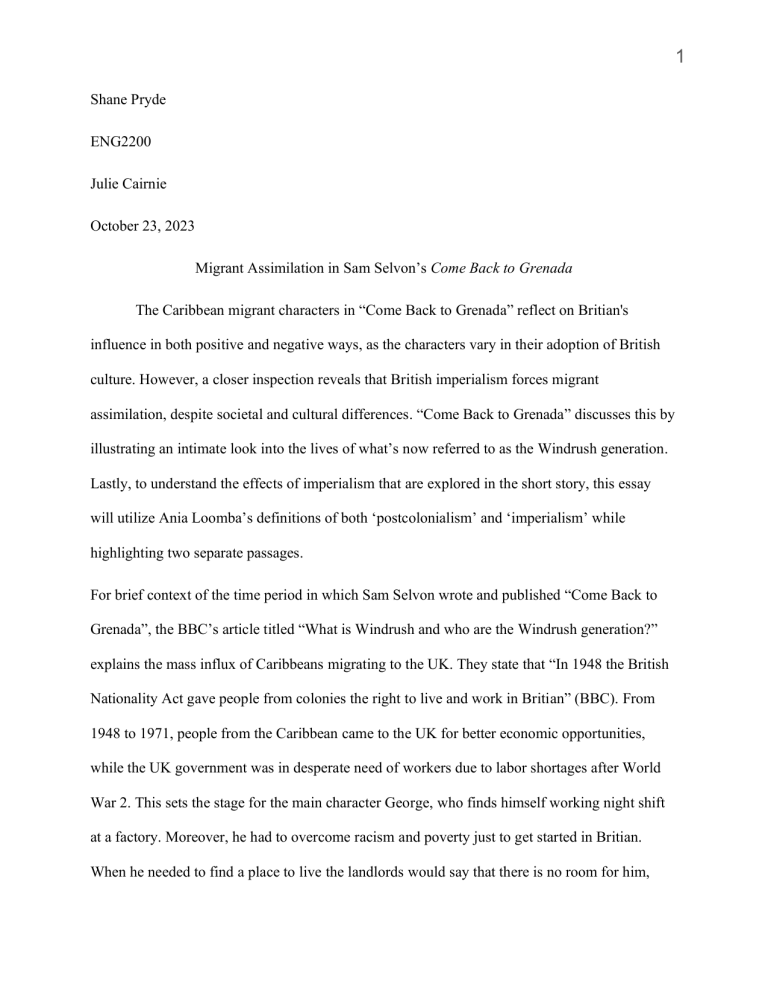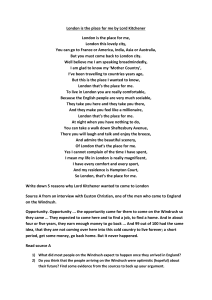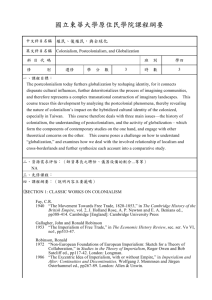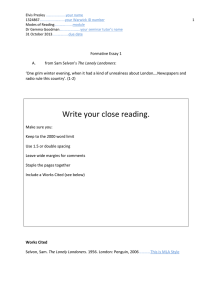
1 Shane Pryde ENG2200 Julie Cairnie October 23, 2023 Migrant Assimilation in Sam Selvon’s Come Back to Grenada The Caribbean migrant characters in “Come Back to Grenada” reflect on Britian's influence in both positive and negative ways, as the characters vary in their adoption of British culture. However, a closer inspection reveals that British imperialism forces migrant assimilation, despite societal and cultural differences. “Come Back to Grenada” discusses this by illustrating an intimate look into the lives of what’s now referred to as the Windrush generation. Lastly, to understand the effects of imperialism that are explored in the short story, this essay will utilize Ania Loomba’s definitions of both ‘postcolonialism’ and ‘imperialism’ while highlighting two separate passages. For brief context of the time period in which Sam Selvon wrote and published “Come Back to Grenada”, the BBC’s article titled “What is Windrush and who are the Windrush generation?” explains the mass influx of Caribbeans migrating to the UK. They state that “In 1948 the British Nationality Act gave people from colonies the right to live and work in Britian” (BBC). From 1948 to 1971, people from the Caribbean came to the UK for better economic opportunities, while the UK government was in desperate need of workers due to labor shortages after World War 2. This sets the stage for the main character George, who finds himself working night shift at a factory. Moreover, he had to overcome racism and poverty just to get started in Britian. When he needed to find a place to live the landlords would say that there is no room for him, 2 although the narrator states that, “truth is because they don’t like black people” (Selvon 122). In addition, the narrator recalls an instance where George is called out by a white child that says “Mummy, look at that black man!” (122). These moments reinforce the hostile and racist environment that the Windrush generation had to endure during assimilation into British society. Despite this, George has no intentions on going back home even though “so many things in London he don’t agree with, so much prejudice about the place” (123). The reason for George’s desires to assimilate with Britian despite the racial discrimination is that the economic opportunities and quality of life are superior to that of Britian’s colonies. The disadvantages against the colonies and the colonized are a direct result of imperialism and can be further examined through the characters' experience of postcolonialism. It is important to note that Ania Loomba’s Colonialism/Postcolonialism does not give postcolonialism a solid definition, but yet a flexible one. Loomba states that, “postcolonialism, far from being a term that can be indiscriminately applied, appears to be riddled with contradictions and qualifications” (16). She later claims that “’postcolonial’ is useful as a generalization to the extent that ‘it refers to a process of disengagement from the whole colonial syndrome” (21). The first passage that will be examined in relation to Loomba’s theoretical terms is during the introduction to Scottie and the dance parties he organizes. Scottie’s and Gogee’s dynamic during their interaction in this passage has underlying themes of postcolonialism effects. This is evidenced in their clashing personalities, where Scottie represents positive assimilation and Gogee represents negative assimilation: Like one time, Scottie standing up near the door of the dancehall, dressup in black suit and bow tie, saying good evening and how do you do to all the people coming 3 to the dance. Well you could imagine Gogee bursting through the door in a hot jitterbug suit and bawling out, ‘Scottie, you old reprobate! What happening?’ Naturally Scottie feel bad that in front of all these English people Gogee getting on so. ‘Listen man,’ he plead with Gogee, ‘Why don’t you behave and comport yourself properly in front of people and stop behaving life a ruffian?’. (Selvon 118) Scottie is humorously labeled a reprobate, meaning a man with no principles, which refers to his combination of British culture and mannerisms despite organizing a Carribean ‘fete’. Scottie’s use of the word ‘ruffian’ to describe Gogee’s actions reinforces his assimilation with British culture, as he is essentially labeling Gogee as a criminal. There’s a sense of frustration amongst the two that is rooted in their differences of postcolonial experience. Scottie's need to impress English people and to act like a gentleman affirms his belief into the system that has colonized him. On the contrary, Gogee’s carelessness and disregard of English opinion represents resistance to assimilating with colonizers. Overall, these two postcolonial perspectives are used to highlight the differences in migrant assimilation and the internal (cultural) conflicts they create. T he second passage will be examined through the lens of Loomba’s definition of imperialism. More specifically, Loomba highlights Lenin’s meaning of the theoretical term and its implications with capitalism. In terms of Western imperial powers, Lenin believed that “colonies lacked capital but were abundant in labour and human resources […] Lenin thus predicted that in due course the rest of the world would be absorbed by European finance capitalists” (10-11). This prediction referred to a global system 4 that Lenin defined as ‘imperialism’. Arguably the cause of the Windrush generation, imperialist structures designed by capitalists depended on the labor of the colonized in order to survive. However, this did not mean that the working class of Britain would be welcoming to the newcomers. This issue is prevalent in the second passage, where the narrator recounts the time the newly migrated George was fired from a factory job: One time when he did new in England George get a work in a factory, and all the people in the place say they go strike unless the boss fire George. It was a big ballad in all the papers, they put it under a big headline, saying how the colour bar was causing trouble again, and a fellar come with a camera and wanted to take George photo, but George say no”. (Selvon 121) During this time, Caribbean migrants had the same rights to work in England as the English people had, they were in fact encouraged to come and work by the UK government. Nonetheless, racial discrimination and a growing movement for segregation made for difficult migrant assimilation. As stated before, George does not intend to go back home despite the racial discrimination he faces. The economic opportunities in England are far greater than they are back home due to Britain’s imperial control of its colonies. This point is reinforced when George thinks about going back to Grenada, but he “feel[s] that he would never get on if he go[es] back” (124). Therefore, he must participate in the capitalist system of Western imperial powers and thus, is forced to assimilate with British culture. In closing, Sam Selvon’s “Come Back to Grenada” dissects the effects of British imperialism through highlighting the lives of the Windrush generation and their implications with postcolonialism. A closer look at Scottie and Gogee’s dynamic reveals the division that is 5 caused between people who share the same culture but have different reactions to assimilation. as well as the innerworkings of imperial systems and how they exploit the colonized. Despite racial discrimination and cultural differences, British imperialism forces migrants to assimilate. WORKS CITED “What Is Windrush and Who Are the Windrush Generation?” BBC News, BBC, 27 July 2023, www.bbc.com/news/uk-43782241. Selvon, Sam. "Come Back to Grenada." The Penguin Book of Migration Literature : Departures, Arrivals, Generations, Returns, edited by Dohra Ahmad, Penguin Books, 2019, pp.11627. Loomba, Ania. Colonialism/postcolonialism. 2nd ed., Routledge, 2005.



